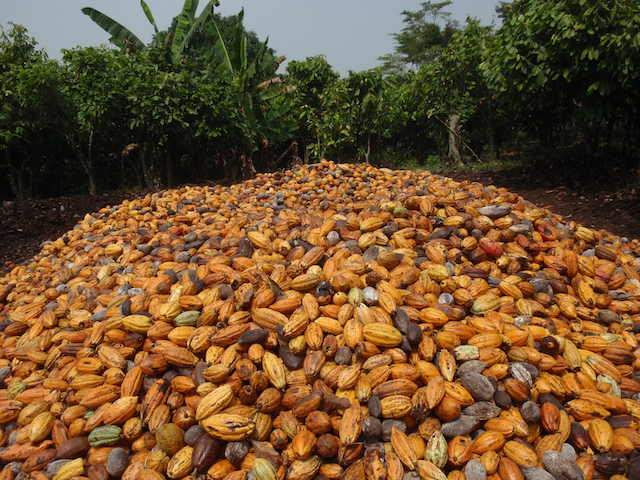Environmental and human rights groups unite for declaration urging cocoa sustainability action

A total of 350 environmental, human rights and NGO groups have combined as signatories for a landmark letter urging the governments of Ivory Coast and Ghana to take key steps ensuring environmental sustainability and support for farmers within the cocoa supply chain. Neill Barston reports.
Among those backing the move are the Ivorian research institute (INADES) and key coalitions such as the Ivorian Civil Society Convention (CSCI), the Ivorian Observatory on Sustainable Management of Natural Resources (OIREN), and the Coalition of Ivorian Human Rights Actors (RAIDH).
It comes as the Federal Association of the German Confectionery Industry (BDSI), also called for precise measures that deliver the recently introduced concept of a living income differential of $400 per tonne of cocoa on export prices, reaches farming communities directly.
Significantly, the joint declaration stressed that more urgently needed to be done on reducing child labour in the industry. “The coronavirus pandemic has compounded existing problems – more farmers are going hungry and child labor is skyrocketing as the economic impacts worsen,” said Amourlaye Touré, Mighty Earth’s West Africa representative. ”We need a well-managed cocoa floor price to protect people’s livelihoods and consolidate the gains we have made in recent years for sustainable cocoa.”
In addition to calls for a cocoa floor price, the signatories are seeking additional safeguards to guarantee that the new price floor provides income to cocoa farmers without incentivising additional deforestation, which is having a key environmental impact that has threatened many of the nations’ native wildlife species.
As the group noted, the letter echoes earlier calls for a well-managed price floor from civil society organisations in Ghana, Cameroon, and the EU and US. The joint declaration further highlights that these issues have taken on added urgency as the global coronavirus pandemic exacerbates poverty and disrupts the economy.
With many farmers working within West Africa attempting to farm on sub-poverty level wages, many observers have called into question the future viability of the industry unless major change is instituted. As Confectionery Production has previously reported, there have been a number of initiatives across the sector from leading confectionery businesses including Mars, Mondelēz International, Ferrero, Nestle, Cargill and Barry Callebaut that has led to the signing of the Cocoa and Forests Initiative which is continuing to address major issues including deforestation.
“Civil society is coming together to fight for sustainable cocoa,” added Amourlaye Touré. “A cocoa price floor is an important step, but the governments must now ensure that industry actually pays the mandated price and that the new funds raised from this initiative actually make it back to the cocoa farmers – many of whom are surviving on less than a dollar a day.”
The joint statement from the NGOs stresses the importance of preventing possible diversions and says that the revenue generated by the price floor must be managed transparently, with benefits accruing to impoverished farmers.
Furthermore, the joint group claimed that within the Ivory Coast, the agency responsible for managing protected areas of forest had experienced notable management issues, as well as similar problems within Ghana. According to the World Bank, as reported by Reuters, the scenario over a perceived lack of transparency has “hurt production and harmed farmers” and highlighted the requirement for urgent reforms.
Crucially, the signatories highlighted studies by the Mighty Earth group that indicated that while it welcomed the industry embracing firm policies on management of forests, levels of deforestation linked directly to cocoa production in Ivory Coast and Ghana have actually increased rather than decreased since the Cocoa and Forests Initiative between the two West African governments and 35 cocoa and chocolate companies was unveiled at the end of 2017. The agreement was built on creation of greater transparency in supply chains, which included farm mapping and monitoring of operations.
However, in 2018, according to analysis highlighted by Mighty Earth, Ghana and Ivory Coast had in fact registered the highest increases in deforestation in the world, with both countries’ forests believed to now be depleted by up to 90% since comparable levels in 1960.
Speaking on its efforts to tackle the issue, Minister of Water and Forests Alain-Richard Donwahi said, “Ending deforestation is a complex social, economic, and environmental challenge. Our new Forest Policy adds momentum for sustainable management of Ivory Coast’s forests, and our National Plan for the Cocoa & Forests Initiative defines the key actions that the government will take. We welcome the initial action plans of industry, and look forward to robust implementation of these public and private commitments to restore our forest heritage and ensure sustainable livelihoods for cocoa farmers. Companies and governments are stepping up – we call on development partners and civil society organisations to join us and support long-term solutions for sustainable cocoa production and forest management.”

According to Mighty Earth’s studies, which included a major direct assessment of forest areas within Ivory Coast over the past few years, there were areas of protected forest that had been almost entirely cleared for cocoa production – which has remained a significant problem within the sector. As wildlife organisations have noted, native species including chimpanzees are facing major pressure on their populations. Mighty Earth stated that it is thought that the Elephant population had reduced to just 200-400 animals, dramatically down from a historic figure of hundreds of thousands.
Significantly, the signatories said that the new Joint Declaration challenges the Ivorian and Ghanaian governments to ensure that the floor price does not trigger a wave of new deforestation in an already devastated landscape. Ivory Coast and Ghana have had some of the historically highest rates of deforestation in the world. Both countries have lost approximately 90% of their forests since independence, with about one-third of that loss driven by cocoa.
“Typically, when a commodity price goes up, deforestation also goes up. The governments must act now to implement the joint monitoring mechanisms they promised to build in 2017 as part of the Cocoa and Forests Initiative,” said a Mighty Earth representative. “We’ve seen real progress in addressing deforestation – Ghana and Ivory Coast both saw primary forest loss decrease by 50 percent from 2018 to 2019 – but now is not the time to get complacent.”
Civil society also pushed for new commitments to respect for the rights of vulnerable smallholder cocoa producers. The group claimed that a new forestry policy announced last year will likely result in the evictions of thousands of small-scale cocoa farmers, with an estimated 1.5 to 2 million cocoa farmers living in protected forests and national parks in Ivory Coast and neighbouring Ghana. The group noted that while the Ivorian government has the right to reclaim forests intended for conservation, international law protects anyone who occupies land from forced evictions that do not respect the dignity and rights of those affected, regardless of where they are living.




very interesting to take in consideration the enveronmenal (mainly deforestation) aspect but also to make sure that producers are motivated…